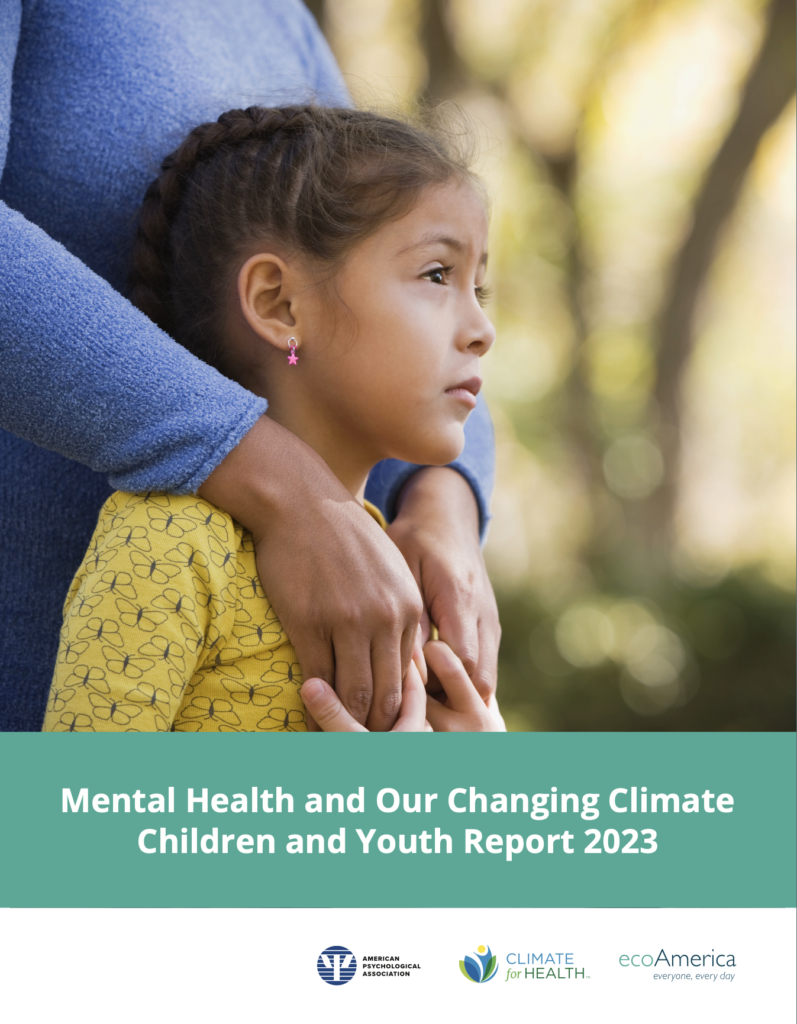Impacts of Climate Change Threaten Children’s Mental Health Starting Before Birth
New report to be published on October 11, chronicles effects by age, offers recommendations for supporting children and youth
Climate change poses a particular threat to children and youth, starting before birth and potentially derailing the normal development of physiological systems, cognitive abilities and emotional skills in ways that are sometimes irreversible, according to a report released by the American Psychological Association and ecoAmerica.
Register for the Launch Webinar

The impacts of climate change intersect with and compound other factors that threaten youth mental health, which is already precarious, according to Mental Health and our Changing Climate: Children and Youth Report. These factors include child development, parental health, rates of depression and suicide, anxiety, racism, poverty, housing security, adequate nutrition, and access to medical care.
The acute impacts of climate change, such as weather disasters, can cause trauma and post-traumatic stress disorder in the short term, and many longer-term mental health challenges in the absence of proper interventions, the report says. Children are more vulnerable because of their dependence on parents and other caregivers for support.
“If our responsibility to ensure a safe climate and thriving future for our children and future generations was not clear enough, this report brings it into vivid relief. My hope is for anyone caring for children — especially policymakers — to join me in following its guidance,” said Meighen Speiser, executive director of ecoAmerica and a co-author of the report.
Research shows that the effect of extreme weather events resulting from climate change can interrupt normal fetal development and lead to a greater risk of anxiety or depressive disorder, ADHD, educational deficits, and lower levels of self-control, as well as psychiatric disorders later in life. The list of possible climate change-related mental health struggles expands as children get older, according to the report. And certain populations of children are even more vulnerable due to poverty, racism, gender, disability, and other factors.
Youth are increasingly feeling frustrated and betrayed by poor governmental response to climate change, the report notes. However, despite rampant climate anxiety, many are motivated to be a part of climate solutions as evidenced by a recent surge in marches and protests. This new report builds on the prior Mental Health and Our Changing Climate: Impacts, Inequities, and Responses report, also developed by ecoAmerica and APA.
Solutions to support children and youth mental health include:
- systems-level solutions to tackle climate change at its root;
- community solutions to increase resilience, meet children’s basic needs, and increase access to mental health care;
- school-based support and hands-on opportunities to act;
- screenings by health care professionals to identify climate-related distress and treatment interventions, and;
- parental support, to teach their children about climate change, manage their fears, find hope, take age-appropriate action, and nurture their capacity for resilience.
“Since the publication of the 2021 report, concerns about the mental health impacts of climate change have grown among scientists, health professionals, policymakers and the public, and the effects on children and youth are more pronounced,” said APA CEO Arthur C. Evans Jr., PhD. “Psychology, as the science of behavior, will be pivotal to making the wholesale changes that are imperative to slow and, we hope, stop its advance.”
Mental Health and our Changing Climate: Children and Youth Report, which synthesizes the results of hundreds of scientific papers, serves as a resource for anyone seeking information about the impact of climate change on the mental health of children and youth. It was written by Susan Clayton, PhD, Whitmore-Williams professor of psychology, College of Wooster; Christie Manning, PhD, Associate Professor of Environmental Studies, Macalester College; Meighen Speiser, executive director, ecoAmerica; and Nicole Hill, MPH, research manager, ecoAmerica.
Register for the launch webinar to hear the major findings of this report from the authors and the action steps for community and elected leaders, children and youth advocates, teachers, environmentalists, philanthropists, medical professionals, and the public.
Helpful Link: Mental Health and Our Changing Climate, 2021 Edition
The American Psychological Association, in Washington, D.C., is the largest scientific and professional organization representing psychology in the United States. APA’s membership includes nearly 146,000 researchers, educators, clinicians, consultants and students. Through its divisions in 54 subfields of psychology and affiliations with 60 state, territorial and Canadian provincial associations, APA works to advance the creation, communication and application of psychological knowledge to benefit society and improve people’s lives. www.apa.org
ecoAmerica is a nonprofit that is moving society toward climate solutions by inspiring and empowering trusted national health, faith, and civic institutions and their millions of stakeholders across America to visibly act and advocate for a healthier tomorrow. ecoAmerica conducts extensive research to inform its work and shares it broadly with anyone working to engage Americans on climate. www.ecoAmerica.org